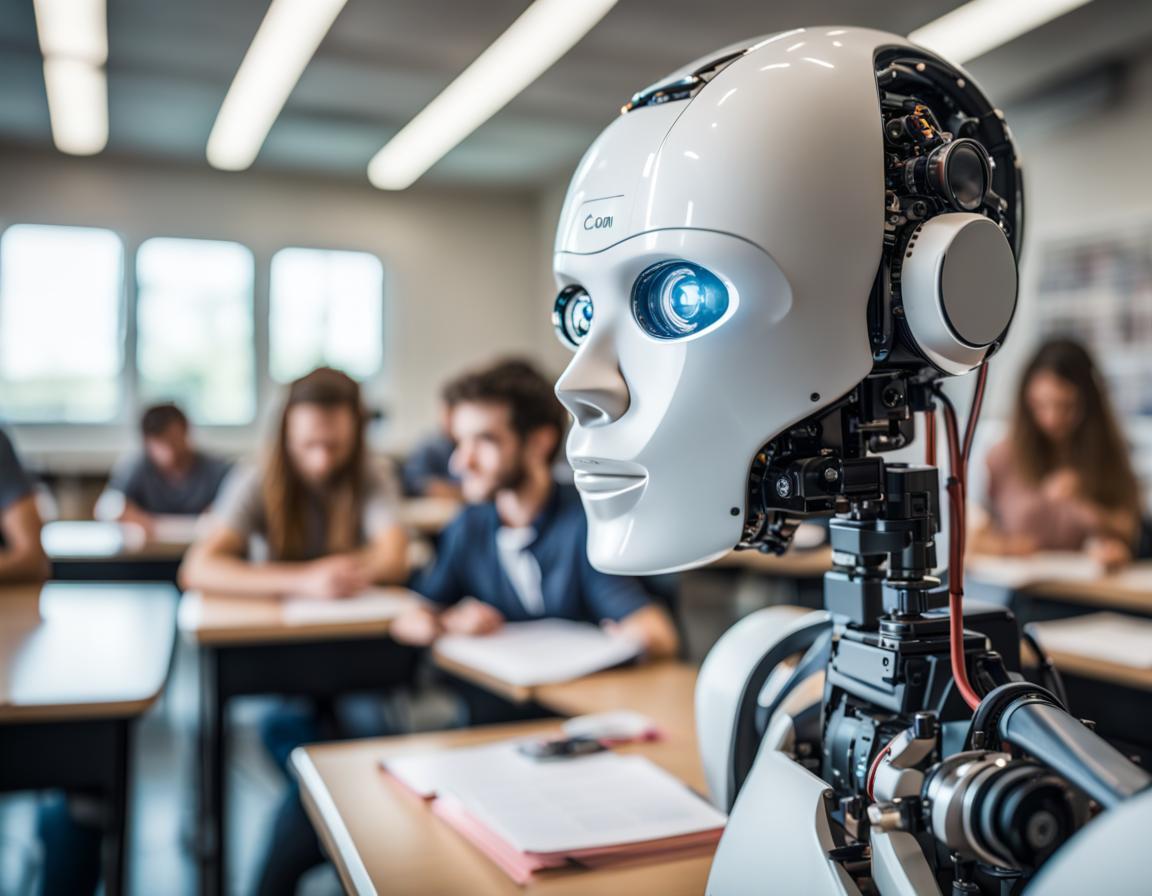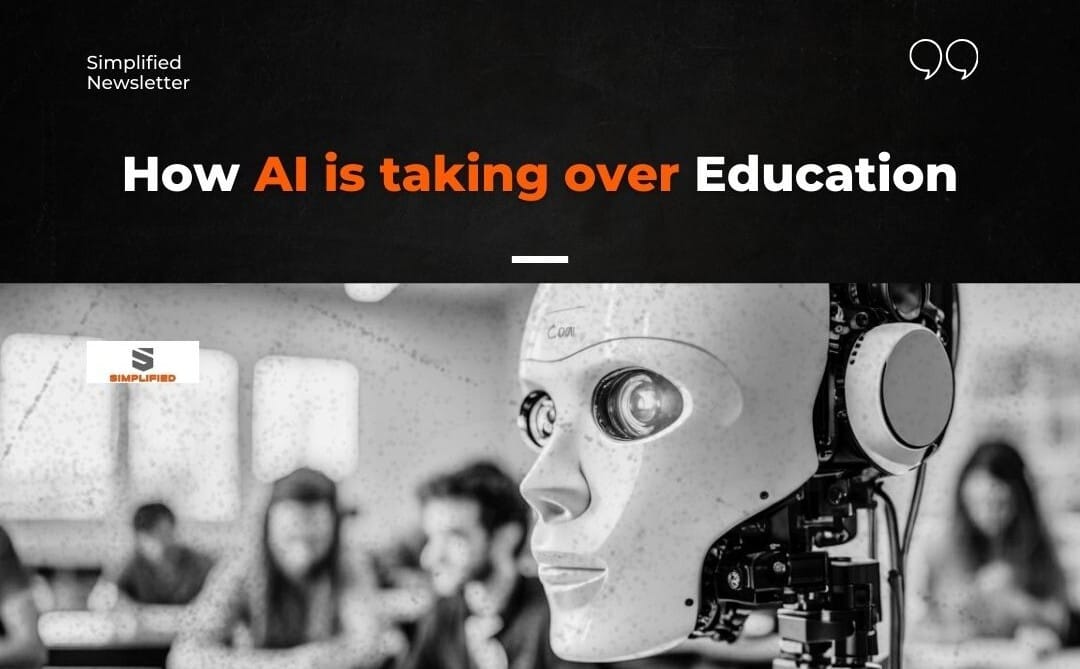2023 is coming to an abrupt end, and arguably one of the biggest changes to our lives is the explosion of artificial intelligence (AI) software made popular by ChatGPT. While AI software has existed long before 2023, the explosion could be attributed more to the astounding capabilities this technology can accomplish. In a variety of tests done, AI has proven consistent ability to complete extended written assignments at a surprisingly high level that is comparable to high school student work. Additionally, this software has displayed advanced ability to write code, compute math equations, and apply human like logic and reasoning to its analysis of text, images, or even videos. This blend of skill and versatility has created an almost unlimited amount of applications for this type of software, leading to many professions coming across it.
While AI is far reaching across many aspects of society, today we are focusing specifically on how this explosion of AI technology has forced educators to adapt rapidly to the changing times regardless of if the change is positive or negative.
Pun completely intended here, but when talking about AI within academics, there seems to exist 2 main “schools” of thought when deciding if it is good or bad.
First, is that the students are over-reliant on this new technology to get by on assignments, thereby making it difficult for today’s educators to not only uphold academic integrity, but to accurately assess those students’ real capabilities in the classroom. In summary, some believe the software is too heavily abused by students to avoid bad grades or committing the time to complete the assignments. This then creates a rippling effect where the students are now not completing the work for themselves, and thus not absorbing the key goal of the assignment. Where this becomes a problem unlike what has been seen before, due to the difficulty in differentiating between AI work and human work, teacher’s often struggle with identifying underperforming students from high performers. Educators hold a responsibility to ensure academic integrity and prepare students with the skills and knowledge to progress to the next grade. With AI software in the fold, how can teachers still assess which students are academically capable for progressing?
Second, educators themselves find value in using this technology themselves. While still holding true to their own ideas for lessons and curriculum, many teachers find that having AI software helps them better streamline their workflow and develop more engaging activities for their students. For example, if an English creates a reading quiz for an upcoming chapter of a book the class is reading, the teacher can now paste that quiz they have made into ChatGPT to have multiple versions of the same quiz generated in a significantly quicker way. This displays a positive benefit of the software. Thanks to AI, that hypothetical English teacher can help reduce the sharing of answers between classes, and limit cheating to ensure academic honesty. Furthermore, in this example, our English teacher had already generated the original quiz themselves, and merely used the software as a means to streamline their normal workflow. In this fashion a realistic argument can be made to how AI can contribute to a positive academic environment.
Today, we're immersing ourselves in the realm of Artificial Intelligence (AI), with a special spotlight on the innovative approaches adopted by Educators. Buckle up as we delve into the nitty-gritty of AI and its profound impact on your academic journey.

The AI Rundown at Schiller
Ever wondered how Schiller International University is navigating the AI wave? It's not just a conversation for them; it's a strategic commitment. The goal? Elevate your learning experience, not replace the irreplaceable human touch of teachers. Imagine a scenario where educators have more time for those engaging discussions, personalized guidance, and those magical "aha" moments.
The Upside:
1. Tailored Learning: Envision this – AI at Schiller invests time in understanding you. It dissects your strengths and quirks, tailoring your educational journey. Whether you're a night owl or an early bird, AI’s got your back, ensuring education feels uniquely yours.
2. Quick Feedback: Ever wished for real-time grades? AI makes it happen. It's like having a personal tutor in your pocket, providing instant feedback and enabling on-the-fly improvements. No more waiting; it's all about refining and enhancing in the moment.
3. Academic Wonderland: AI unlocks a treasure trove of fresh and updated study materials. Picture a virtual buddy, a genius in every subject, ready to chat and share knowledge whenever you need it.
From the Teacher’s Perspective:
Thanks to an interview by Education Week, we are given a first hand view of how AI is integrated into the classroom. Arkansas Educator, Tyler Tarver, shares how AI software has streamlined the preparation process, to assist with stronger in classroom activities for his students.
While some may view this as a lazy practice, Tarver dispels this rumor by explaining how AI use is not a replacement to a teacher developed curriculum, but rather a resource to help develop the ideas of their lessons.
Check it Out:
The Future's So Bright:
Smart Tutoring: AI transforms into your study companion, adapting to your skills and presenting challenges tailored to your strengths. If a subject gives you the jitters, AI's got your back with personalized support.
Virtual Help Desk: Meet your AI assistant, a 24/7 buddy answering questions and providing handy tips. It's like having a tireless academic sidekick always at your beck and call.
Teamwork, AI-Style: AI plays matchmaker, forming study dream teams based on your skills. Imagine a superhero squad for group projects, each member bringing their A-game.
Real Talk About AI

No sugarcoating - AI isn’t all sunshine and rainbows. While Artificial Intelligence (AI) in education holds tremendous potential, it’s crucial to acknowledge and address the associated challenges and potential drawbacks. Let’s dive into some of the negatives:
AI's Ethical Chat:
In a world where AI generates essays, keeping things ethical is like walking a tightrope in a storm. Tools like ChatGPT raise crucial questions: Does AI enhance learning or disrupt the learning mojo? Can we trust what AI creates?
Overreliance on Technology:
An overreliance on AI might lead to a diminishing emphasis on traditional, foundational skills. If students become too dependent on AI for tasks like writing or problem-solving, there's a risk of neglecting essential skills such as critical thinking, creativity, and effective communication.
Lack of Emotional Connection:
While AI can provide valuable insights and support, it lacks the emotional intelligence that human educators bring to the table. Learning is not solely about facts and figures; it's also about emotional support, mentorship, and fostering a sense of belonging. AI might struggle to provide the human touch needed for holistic education.
Bias in AI Algorithms:
AI systems are only as unbiased as the data they are trained on. If the training data reflects existing biases, the AI algorithms can perpetuate and even amplify these biases. In an educational context, this could result in biased assessments, recommendations, or learning materials, potentially disadvantaging certain student groups.
Privacy Concerns:
AI systems often require extensive data for effective learning and customization. The collection and storage of sensitive student data raise privacy concerns. Safeguarding this information becomes crucial to prevent unauthorized access and potential misuse.
Balancing Act:
Our perspective? Don't throw the AI baby out with the academic bathwater. Sure, AI has its quirks, but it's all about how you use it.
Challenges Unveiled:
In this AI-driven educational landscape, maintaining academic integrity is our compass, but it's no easy ride. The simplicity with which AI generates text poses challenges. Plagiarism, cheating, and ethical concerns find new avenues with AI tools like ChatGPT. The million-dollar question: Does technology encourage shortcuts, undermining the very principles of learning?
Striking the Right Balance:
Here's the crux – AI is a tool, not the teacher. While it can assist with writing, there's a risk of leaning too heavily on AI-generated content. The key is guiding students in the responsible use of technology. It's about nurturing critical thinking skills to discern the quality and depth of AI responses.
As we embrace the positive transformations brought about by AI in education, it's vital to navigate these challenges thoughtfully. Striking a balance between technological innovation and preserving the core values of education is key to harnessing the benefits of AI while mitigating its negatives. Continuous dialogue, ethical considerations, and adaptability are crucial as we shape the future of AI in education.
Take Time to Reflect…
We've uncovered the upsides – personalized learning, instant feedback, and an academic wonderland at your fingertips. The future looks promising with smart tutoring, virtual help desks, and AI-style teamwork. Yet, let's acknowledge the real talk; AI isn't a flawless solution. It challenges us to navigate ethical concerns, uphold academic integrity, and strike a delicate balance between augmentation and autonomy.
As we tread this path, maintaining academic integrity becomes paramount. The ease with which AI generates content opens doors to ethical quandaries. Plagiarism and cheating find new avenues, urging us to question not just the technology itself, but our approach to its integration.
However, in facing these challenges, we're not merely adapting to AI; we're reshaping it. Education becomes not just a transfer of knowledge but a critical journey where students learn not just from AI, but about it. It's a call for tech etiquette, responsible use, and a symbiotic relationship where AI amplifies human potential without overshadowing it.
FROM THE FOUNDER
Thank you for taking the time to read and enjoy Simplified Weekly Newsletter. A lot of effort has gone into hand selecting interesting and dynamic content to deliver to you.
If you enjoy what you see here I encourage you to visit our other social media accounts below for more or share the newsletter with family or friends!
Thank you,
-Zach Nailon, Simplified Weekly Newsletter
